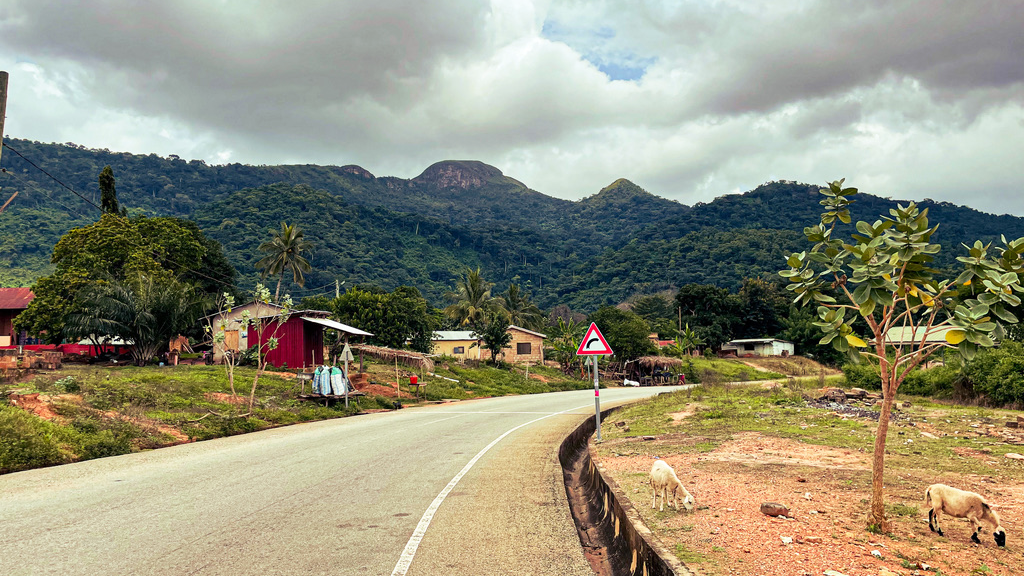School of Health Undergraduates Conduct Research in Ghana as Part of a Team of Interdisciplinary Scholars
(October 28, 2022) — Two School of Health undergraduates embedded with a team of researchers say experiencing public health and cultural humility in real time has taken their global health coursework to a new level.
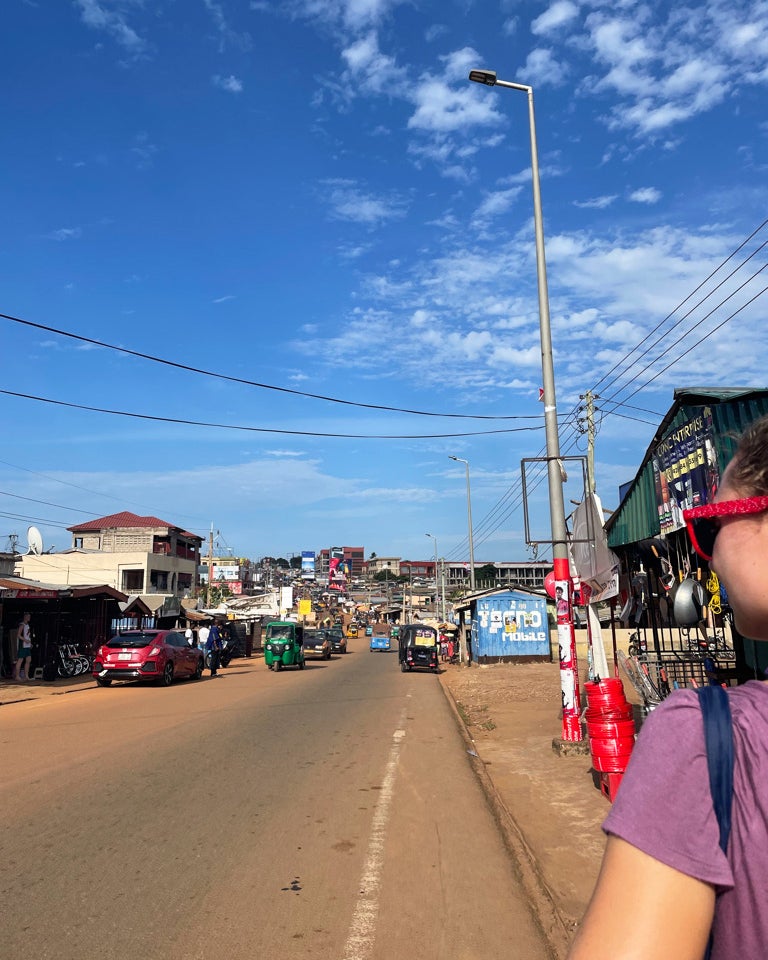
Westerman (H’23) walking along a road in Ho.
The students, Emme Rogers (H’22) and Clare Westerman (H’23), are in Ho, Ghana, researching reproductive and sexual health with the Institute of Health Research (IHR) at the University of Health and Allied Sciences (UHAS).
For 15 weeks, August 25 through December 9, the students are treated as visiting researchers at the IHR, which is composed of interdisciplinary scholars researching public health concerns in Ghana.
Rogers, who will be graduating at the conclusion of the fall semester, is researching the education pregnant women receive about completing malaria treatments, while Westerman is looking at what motivates adolescents to seek sexual and reproductive health services.
“Every student who participates experiences a community of research,” said Matilda Aberese-Ako, PhD, a medical anthropologist from UHAS who is also a visiting scholar with Georgetown’s Department of Global Health this semester. She is an expert on access to prenatal care in tribal areas of Ghana, and her qualitative data concerning pregnancy and malaria is being used by Rogers in her research.
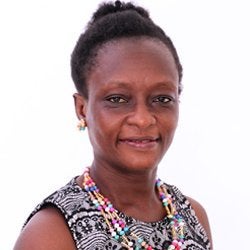
Matilda Aberese-Ako, PhD
The Department of Global Health has collaborated with Aberese-Ako and UHAS for the past three years to bring students to Ghana to pursue research projects based on their interests.
Both students mentioned how valuable it is to work closely with other established researchers. “My work is qualitative, so if I am reading a transcript and it doesn’t make sense, I can also ask a fellow IHR researcher about it and they will add more context to explain what is happening,” said Rogers.
Researching in Ghana
Rogers is using one of Aberese-Ako’s data sets to conduct secondary research on malaria in pregnancy.
“I’m focusing on the dynamic between health care providers and mothers when it comes to health education,” she said.
Rogers found that despite Ghana having a high rate of prenatal appointment attendance, pregnant women are unable to describe why it is important for them to complete preventive malaria treatment.
“If women had more information, they would possibly be able to complete the treatment,” she said.
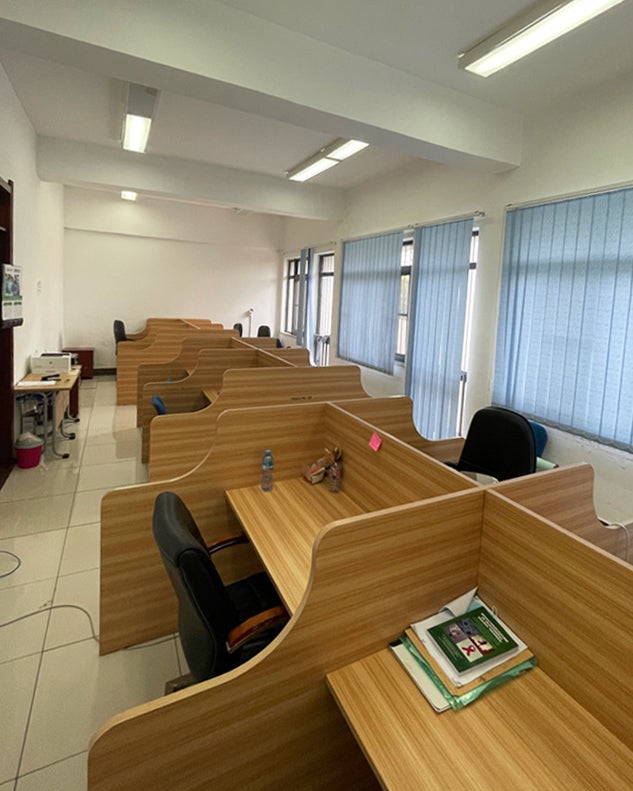
The space where the students work at UHAS
Rogers hopes to eventually supplement the secondary research by going out into the community and conducting interviews.
Westerman’s work is focused on adolescent sexual and reproductive health. “I think adolescent health is a unique part of life, but is still underserved,” she said.
Westerman’s work is quantitative — she’s performing regression analyses on IHR community survey data.
“I noticed that the Adaklu District had one of the highest teenage pregnancy rates in the country,” she explained. “I’m looking at the knowledge levels about sexual health that people in the community have, and possibly what factors contribute to higher levels of knowledge.”
Westerman sees both knowledge and access to services as necessary in order for adolescents to be successful in protecting their sexual health.
“Only about 10% of adolescents use sexual and reproductive health services,” she said. “One of the factors I found that predict whether adolescents use services is communication with parents about sexual health.”
Experiencing Public Health Research in Real Life
Rogers and Westerman attended a community health event about sexual and reproductive health for boys and girls ages 7 to 19 years old. The event was a government-sponsored initiative to help address teenage pregnancy in Ghana.
“The event was similar to a health class, where the boys and girls were taught about menstrual hygiene and other topics in an interactive environment,” said Westerman.
“It was interesting to see the different educational strategies they used to keep the kids engaged,” said Rogers. “The boys and girls were also not split up, which reduces the stigma around menstruation for girls.”
Organizers and the adolescents at the community health event spoke Ewe, the local language, but Rogers and Westerman were told the topics being covered in English so they could follow along.
“It was impactful to see public health and global health practiced in real life,” said Rogers. “We study these topics in class, but it’s something else to see social change and community involvement in front of you.”
Life in Ho
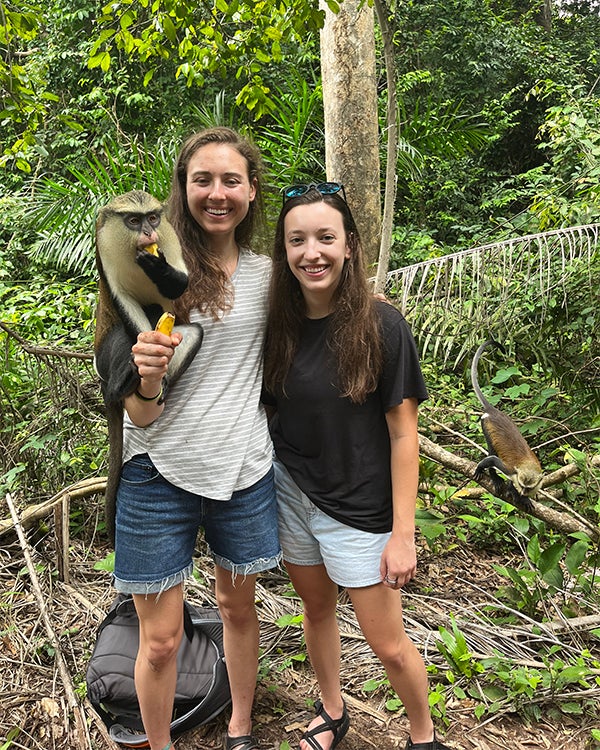
(l to r) Westerman (H’23) and Rogers (H’22) visiting a monkey sanctuary
Both Rogers and Westerman described Ho as having a small-town atmosphere, where shopkeepers who specialize in one thing, such as fruit or eggs, quickly remember your orders.
“Everyone is very polite,” said Rogers. “If you pass anyone on the street, they say good morning to you.”
Rogers and Westerman also had the chance to explore the area, including hiking a local mountain and visiting a monkey sanctuary.
“The monkeys are wild, but they are so comfortable being around people they will walk up to you and eat out of your hand,” said Westerman. “I’m learning so much about Ghanaian culture outside of the research.”
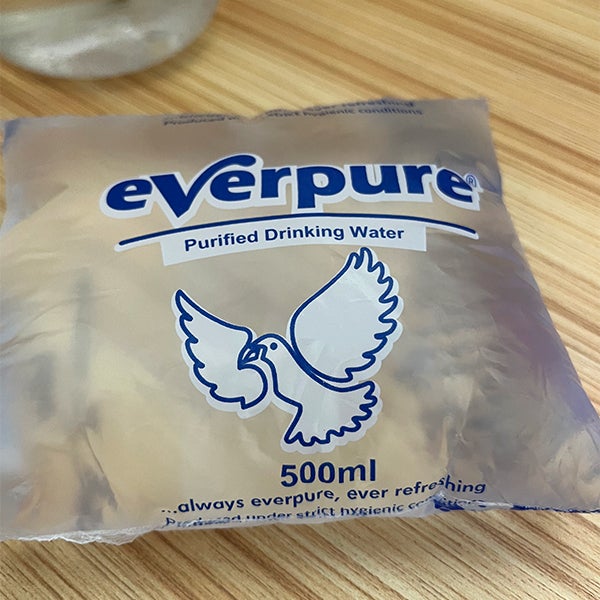
A water bag purchased from the water store
Being in Ghana also made Westerman appreciate access to tap water. “You can’t drink the tap water here, so you either boil it or you buy water in little square bags from a local water store,” she explained.
Westerman was diagnosed with COVID-19 while living in Ghana. “I could not find clear guidelines of what to do after testing positive,” she said. Westerman noticed people reacted to her being COVID-19 positive by either seeming not to care or staying away from her.
“My experience with COVID showed the differences but also the similarities in attitudes towards the virus in the U.S. and Ghana,” she added.
An Impactful Capstone
Rogers hopes to continue to work in health advocacy, and Westerman is currently in the process of applying to medical schools.
“This capstone course — the practical experience abroad — is really a culmination of all the courses you take,” said Rogers. “You really see it all come together — the research methods, global health, health systems, and the local context.”
“This experience has made me more aware of cultural differences and showing respect to people you meet through cultural humility,” Westerman said. “It’s been a great experience.”
Heather Wilpone-Welborn
GUMC Communications
Top Image: The view driving into Ho

